This is the last article you can read this month
You can read more article this month
You can read more articles this month
Sorry your limit is up for this month
Reset on:
Please help support the Morning Star by subscribing here
THE Nuclear Education Trust’s (NET) new report examining experiences of defence diversification around the world and their lessons for Britain is extremely welcome.
Jeremy Corbyn has made it clear that a Labour government led by him would make big changes to Britain’s foreign policy.
He has apologised to the people of Iraq for the Blair government’s participation in the illegal invasion of the country in 2003, an unprovoked act of aggression that has led to over a million deaths and, through facilitating the exponential growth of al-Qaida and its Isis offshoot, played a large part in fuelling current warfare across the Middle East and the escalating refugee crisis.
He has stood firm against the absurdity of “humanitarian bombing” when the David Cameron and Theresa May governments in turn decided to lob more explosives onto the Syrian bonfire and, in last year’s election campaign, drew out the ways in which Britain’s endless participation in US-led conflicts has not just spread death and destruction abroad but brought these horrors to our own streets.
The very creation of the post of shadow minister for peace and disarmament, whose occupier Fabian Hamilton welcomed the NET report today, shows the gulf between Labour’s determination to use government to make the world a better place and the Conservatives’ commitment to a future of exploitation and war without end.
An ethical foreign policy would have consequences for the arms industry.
It would involve dropping the cripplingly expensive, useless and dangerous replacement of our Trident nuclear weapons.
This is not currently Labour Party policy, but Corbyn’s decades of support for the Campaign for Nuclear Disarmament and Stop the War Coalition indicate that he would certainly take action to make disarmament a reality if the opportunity arises — which Britain is pledged to do anyway by the terms of the Non-Proliferation Treaty.
It would also mean halting sales of lethal weaponry to governments that use them for “internal repression or external aggression” such as Saudi Arabia or Israel. Again, Britain is actually obliged to do this already, but successive Conservative and Labour governments have treated these solemn obligations with contempt.
Britain’s arms industry employs tens of thousands of highly skilled workers and the engineering and design expertise they possess is an asset of immense value to us as a country.
Many of these workers regard talk of defence diversification with suspicion, seeing it as window-dressing on a scheme to tear up their industries and leave them out of work.
They can hardly be blamed. The progressive degradation of British manufacturing from the Thatcher era onwards has seen repeated promises of workers being retrained or re-employed in the industries of the future.
These promises have been broken by those same successive governments whose indifference to human rights abroad is matched by their lack of interest in the welfare of workers at home.
Labour’s current leadership is different, since it is committed to a serious industrial strategy that would see state-directed investment in sectors of strategic importance. The skills of our weapons manufacturers will be invaluable in producing green energy, sustainable urban development, transport infrastructure and much more besides.
It’s vital that workers in the industry itself help shape their role in designing the technologies of the future. Not least because their future is hardly secure under present circumstances. As the NET makes clear, the number employed in the arms industry has shrunk dramatically in recent years and is still shrinking.
Hence the importance of Unite’s proposal that the Ministry of Defence and its suppliers be given a statutory duty to look at diversification options and the 2017 TUC Congress’s call for Labour to set up a defence diversification agency.
The NET report is a mine of information on what has and hasn’t worked elsewhere. It should feed into one of the most important projects of the next Labour government.











